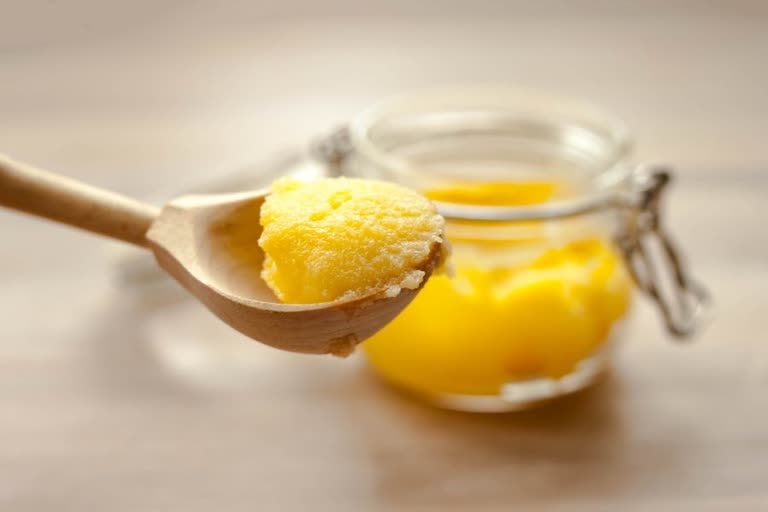Ghee is a pure clarified fat made from milk and milk products. Ghee is essential in some cultures, especially in the Indian diet. It is known as 'samna' in Egypt, 'Samn' in the Middle East, 'Rogan' in Iran, 'Samuli' in Uganda. Known by different names, but consisting of the same health benefits, here are a few things you need to know about Ghee.
Ghee Nutrition Profile:
- Calories/5gm-44.8kcal
- Protein/5gm-0g
- Carbs/5gm-0g
- Fats/5gm-4.9g
Ghee is also rich in essential fatty acids and vitamins-- minerals such as Vitamin A, E, K2, D, calcium, CLA and Omega-3.
There are 3 types of ghee:
- Regular ghee: Ghee is made by melting regular butter from cow or buffalo.
- A2 ghee: Made from desi Indian cows like Gir cow and red Sindhi
- Bilona Ghee: The most traditional way to make ghee. It is the purest ghee made from desi cow milk.
Benefits of ghee:
- A spoon of Ghee with a glass of milk and turmeric with black pepper cleanses the digestive system of its toxins. This helps with constipation and gives a much-needed boost to your immune system.
- One of the most significant ayurvedic benefits of ghee is it helps in improving metabolism. This will greatly improve your mood while also adding to your energy levels and helping you lose weight.
- Ghee is a rich source of butyric acid. It works as probiotic food for the bacteria in the gut.
- Ghee has Vitamin K2, which helps the bones in absorbing the calcium and helps in joint pain.
- Ghee with turmeric and black pepper reduces inflammation as well as stress -- which may help in better sound sleep.
- Ghee is unctuous in nature and brings a glow to the skin.
- CLA in ghee reduces tumours, lowers cholesterol and stabilizes blood sugars. It also helps in stimulating appetite.
Health Cautious:
1 spoon or 5gm of ghee is high in calories and fat. Cooking food in ghee is one of the best methods of cooking curries, sabzi, dals, etc. But few people with health conditions such as Diabetes, Obesity, high cholesterol, heart patients and PCOS should be cautious about the quantity of ghee.
How much to add:
3-4 spoons a day of ghee can be added with individuals who lead a healthy active sedentary lifestyle. With increased daily calories, you can increase the ghee intake accordingly.
(Lakshita Jain, Certified Clinical Dietician, Lecturer, Diabetes Educator, Meat Technologist, and Founder of NUTR)
(IANS)
Also Read: All You Need To Know About Cooking Oils



